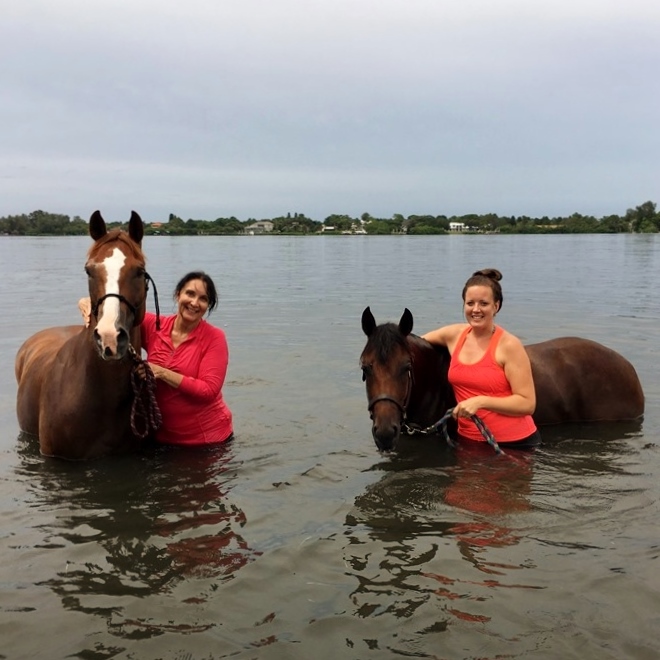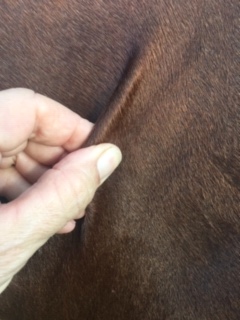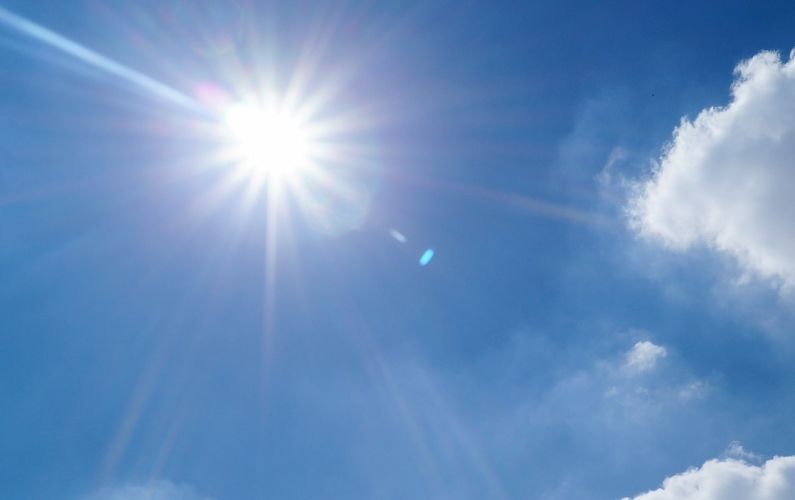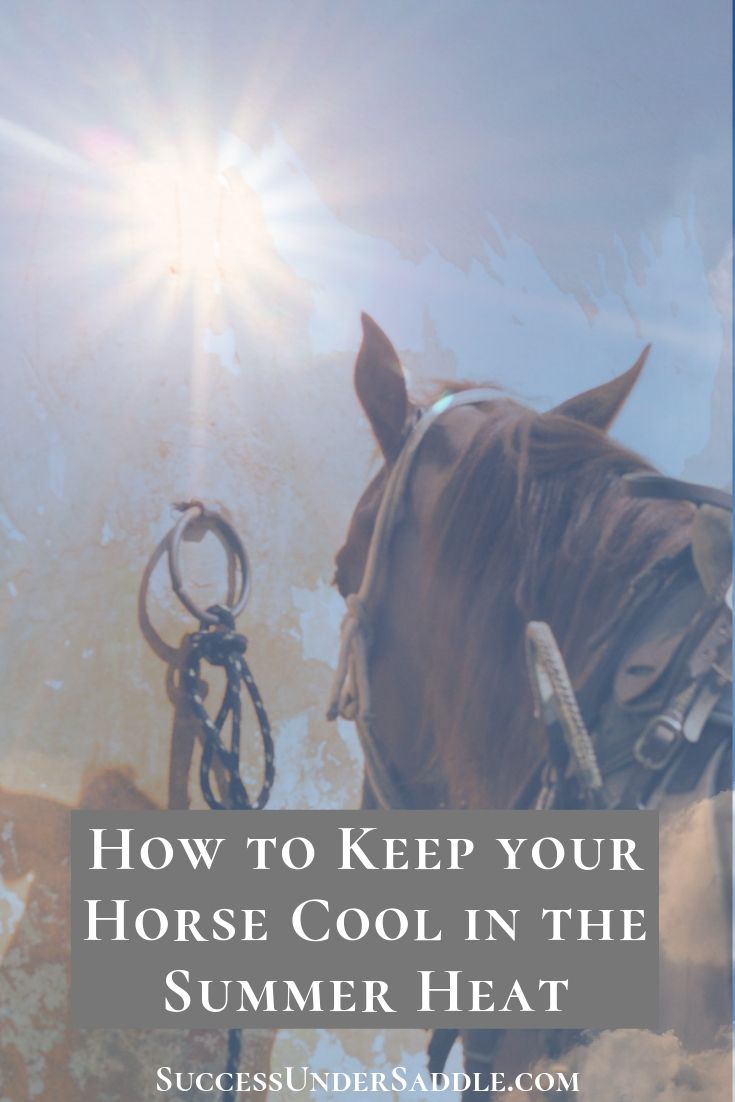Are horses OK in summer?
Ya’ll, it’s hot out there! Keep your horse cool in the summer heat! As I write this, dangerous heat is expected all over the United States this weekend. I live in a hot and humid climate, so summer is a challenge under normal conditions, but if you are feeling the effects of extreme heat, you will want to take extra precautions to keep your horse comfortable and safe.
Horses lose their lives every year to heat stroke. Young, old or ill horses are especially susceptible to heat related issues, but if you don’t monitor your healthy adult horse, he could get into trouble, too!
What temperature is too hot for horses?
As a very general rule, you can gauge if it’s too hot to ride by adding the actual temperature to the percent of humidity. For a 90 degree day with 85 percent humidity, the total is 175. If that number is 180 or above, it’s too hot to ride.
10 Tips to keep your horse cool in the summer:
- Ride early in the day. My routine in the summer time is to be at the barn by 8am. Since I ride cutting horses, we will often meet as early as 6:30 am to practice. Cattle get hot too! If your barn has a covered arena, you may be able to ride later in the day.
- Keep your horse fit. An overweight horse requires more energy to move around, so he’ll produce more heat. Keeping your horse fit will help them tolerate the heat. It’s important to monitor even a fit horse during training and competition in hot and humid climates. Consider using less tack. Minimize saddle pads and leg boots. .Avoid riding your horse altogether when the air temperature and relative humidity combined exceed 150.
- Provide fresh, cool water at all times. Horses can easily consume more than double their normal water intake in hot weather, so be prepared for this. If you have water buckets in your stalls, consider adding another bucket or two and refilling often.The average 1000 pound horse at rest drinks 8 to 10 gallons of water a day. By drinking cool water, they will be able to lower their body temperature on their own. If your horse isn’t a big drinker, you can encourage water consumption by providing free choice salt and mineral blocks in stalls and pastures. You may also want to provide electrolytes. Horses lose electrolytes along with water in their sweat.
- Provide shade during the day. Make sure plenty of shade from trees, shelters or run-in sheds is available. Obviously a horse in a stall is provided shade, but be sure the stall is well ventilated. If you are in a lightning prone area like I am, being turned out in the late afternoon may not be a good option.
- Turn out at night. If your horse has a stall, but is turned out for part of the day, consider switching to evening or overnight hours. Summer heat can also take a toll on the quality of your pasture. You might need to provide additional feed as pasture grass becomes sparse.
- Create a breeze. Fans are a great way to help keep the air moving in the barn and will help keep your horse cool. Be sure they are in installed is a place where your horse can’t get to the cords and plugs. Whatever fan you choose, make sure that there is a controlled mechanism in the fan to switch it off if it starts to overheat.
- Use Misting Fans. You are fortunate if you have a misting system for your horse. But, there are great options for misting fans available as well. Consider installing one. Frequent misting is far more effective than a single dousing with a hose.
- Provide Extra Bedding. Soft deep bedding is helpful this time of year to provide comfort and relief from the hot, hard ground found in some areas.
- Clip horses with longer hair coats. While some coat can provide protection from the sun, a long, thick coat tends to hold heat and makes it difficult for the horse to cool down. Be careful not to clip the hair too close, however, as it provides some protection from damaging rays.
- Participate in “cool” activities. Take advantage of cool dark trail rides. Visit lakes, streams and beaches where you can your horse can go for a swim!

What do you feed your horse in the heat?
Your horse’s feed needs change during the summer. It’s normal for appetites to drop off during periods of extreme heat. Feed like alfalfa, oats, and corn produce more heat than grass hay or pasture.
Because of its high water content, pasture grass or grass hay is the ideal food. If your horse doesn’t have enough grass available for it to be his main food, try tempting him with carrots, celery, apples, watermelon, squash or salad greens added to a high moisture mixture of soaked beet pulp and wheat bran.
Try making a pop-sickle for your horse by placing some of the greens above in a bowl of water and freezing it. When temperatures rise, turn it over into his feed bin. He will slurp up the water as it melts and eat the treats!
You can also have your horse consume more water by adding it to his hay and feed. Soaking his hay is a great way to pump more water into your horse. One flake of hay can soak up about 2 gallons of water. Try putting his hay into a “hay only” wheelbarrow. Load with a few flakes of hay, add water, soak for a bit out of the sun, and tip the wheelbarrow to drain.
Can Horses Over Heat?
Yes! Overheating can be a serious problem for horses. Your horse’s normal body temperature is 98.5 to 101 degrees Fahrenheit. Hot weather and high humidity can cause his body temperature to rise especially as he exerts himself. Be aware that overheating can also result from other factors such as:
- Poor barn ventilation
- Prolonged exposure to direct sunlight
- Excessive work
- Transportation
- Obesity
Horses that are overweight or out of condition are most prone to overheating.
How can you tell if your horse is overheated?
Horses normally cool themselves by sweating. The sweat evaporates from the skin surface and causes a cooling effect. A horse that is working hard in a hot environment can lose 2 to 4 gallons of sweat per hour. Less sweat evaporates during times of high humidity and can cause overheating.
If you suspect that your horse is overheated, the best way to tell is to take his temperature and monitor his heart and respiration rate.
Signs that your horse may be at risk of overheating include:
- Elevated Temperature. Any horse with a temperature over 102°F after a cool-down walk from working may be at risk.
- Elevated Heart Rate. A pounding heart transfers blood to your horse’s skin surfaces to be cooled by outside air. If his heart rate is more than 80 beats per minute, and doesn’t start to slow down after two minutes’ rest, he may be at risk.
- Increased Respiration Rate. A horse should breathe more rapidly right after exercise, however, if his breathing should return to normal after two minutes’ rest. If your horse’s respiratory rate is more than 40 to 50 breaths per minute, and/or he’s breathing shallowly, he may be at risk.
Other signs include:
- Profuse Sweating. Evaporation of sweat from your horse’s skin helps him cool down. if he’s sweating over his entire body or worse, he stops sweating entirely he could be at risk.
- Seems Lethargic.. You may also notice an overheated horse just standing and appearing not interested in his surroundings. He may seem weak when moving. Lethargy is caused when blood is being transferred away from your horse’s vital organs to his skin surfaces for cooling, leading to severe heat stress.
- Discolored Mucous Membranes. As your horse’s circulatory system becomes overwhelmed by trying to cool itself, blood may pool in his gums. If his gums become dark red or “muddy” colored he may be at risk. A normal horse’s gums should be a healthy pink color. The color fades when you push on his gums, but it should return in under 3 seconds.
- Check for signs of dehydration with a skin-pinch test. Gently pinch up some skin along your horse’s neck between your fingers. This will form a small “tent,” and the tented area should snap back down quickly. If it is slow to return to normal, your horse may be dehydrated.

How to Cool Down an Overheated Horse
A mildly overheated horse generally responds rapidly and fully to the cooling remedies below. If your horse is not responding, don’t hesitate to call your veterinarian.
The best way to cool down an overheated horse is to:
- Get them into the shade away from direct sunlight.
- Give him a cold water bath. Using cold water from a hose, run water over the horse’s chest, the jugular grooves of his neck, and the lower legs. These areas have many superficial blood vessels that can be rapidly cooled by the water and will carry the cooled blood to the interior of the horse.You can add ice to the water to speed-up cooling for very hot horses (rectal temperatures above 105 F). Research shows using ice to cool a hot horse is safe. Ice baths reduce core body temperature and lower heart rates. Putting ice on the poll, jugular vein, carotid artery and femoral artery (inside of rear leg) will cool the horse quickly
- Some vets recommend alcohol baths mixed in a 1:1 ratio. Alcohol evaporates quickly, and pulls heat away from the horse’s body much faster than water alone does .Once the horse seems less distressed (breathing eases), progress to hosing the entire body. Continue the hosing until the water running off underneath the horse’s body feels cool. This means the water is no longer picking up large amounts of heat from the surface of the skin.
- Offer your horse cold water and encourage him to drink. Allow him to have as much as he wants. Walk your horse slowly in a shaded area. Observe him carefully to make sure his breathing rate doesn’t climb again or that he begins to sweat. If this happens, repeat the cooling process. Offer water at frequent intervals throughout this process. If the horse is very distressed at first, or breathing/panting heavily, he probably won’t drink. Keep trying.
- Get a breeze going. Slow walking creates a bit of a breeze over your horse’s body. Stand your horse in front of a fan or put him in a breezy location.
If Symptoms Persist, Call Your Vet
With care, conditioning, attention to hydration, and electrolytes, your horse should never suffer from overheating.
Conclusion
Summer doesn’t have to bring all your activities with your horse to a halt. In fact, summer usually brings a plethora of activities, shows and competitions with it! By making some changes to your horse’s riding routine, you can enjoy both your horse and summer!
What do you do to help your horse in the summer? Do you have any tips or tricks you want to share? Let me know!
Are you looking for your first or your next dream horse? You will want to get my free Dream Horse Buyer’s Guide! It’s full of everything you need to know to narrow your search and select your new best friend. Get it today by clicking the button below!
Enjoy the Ride!


